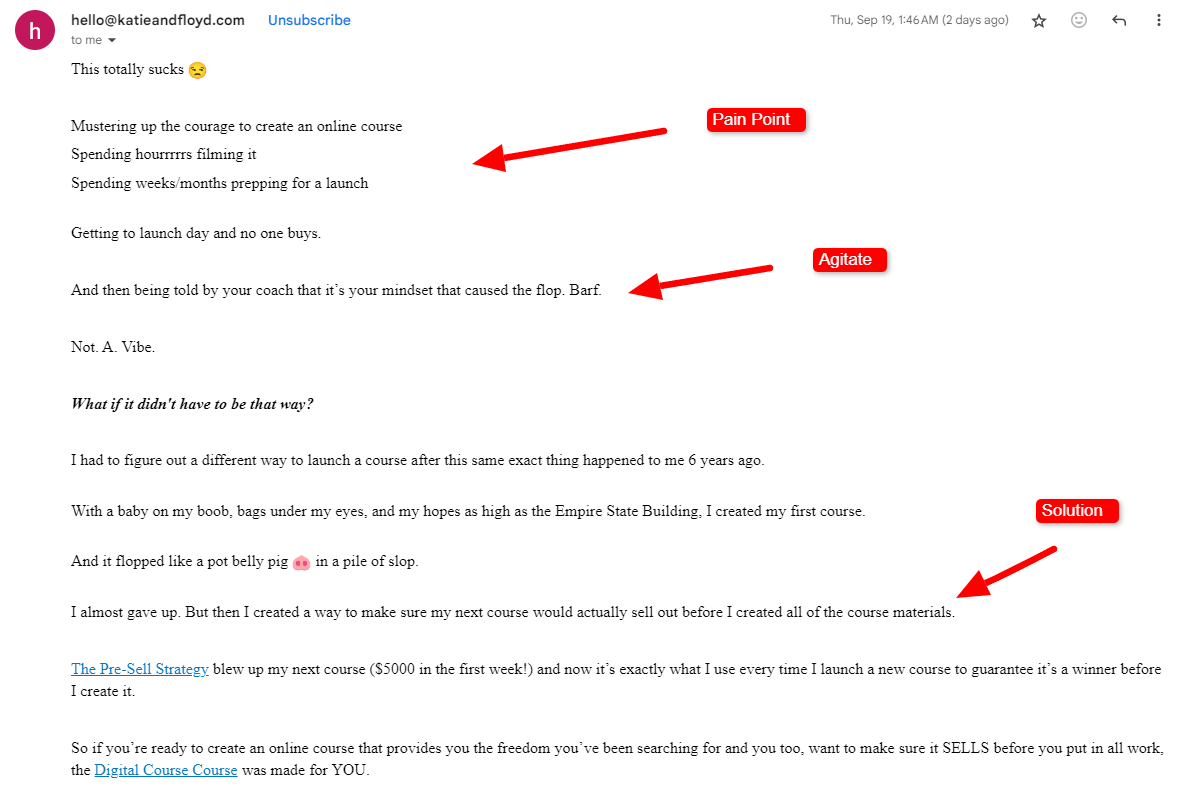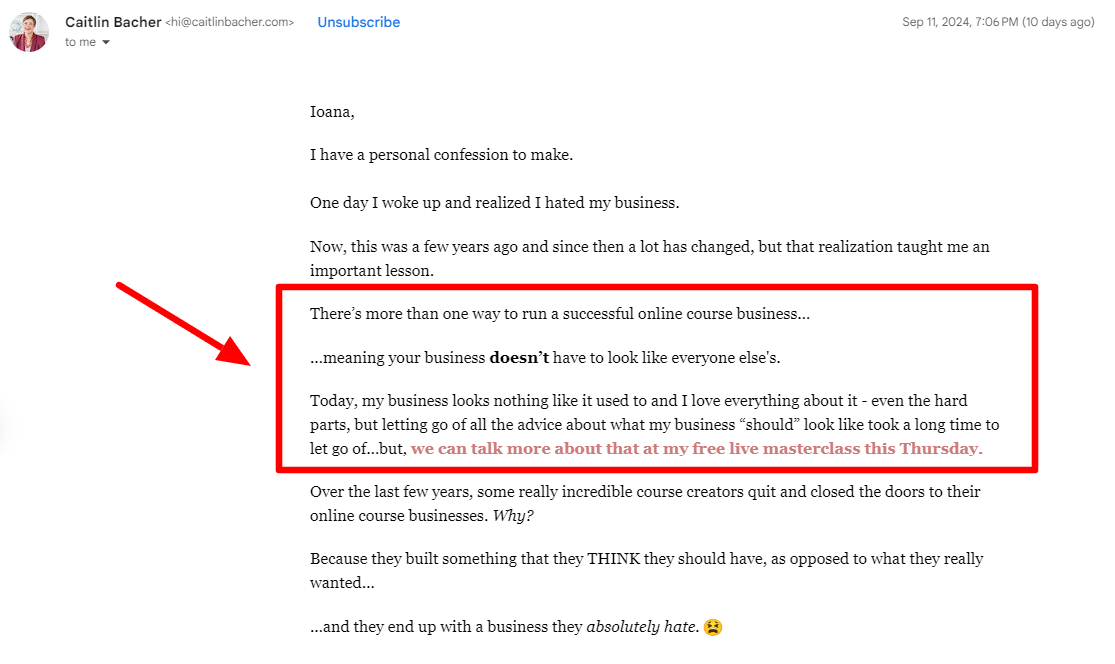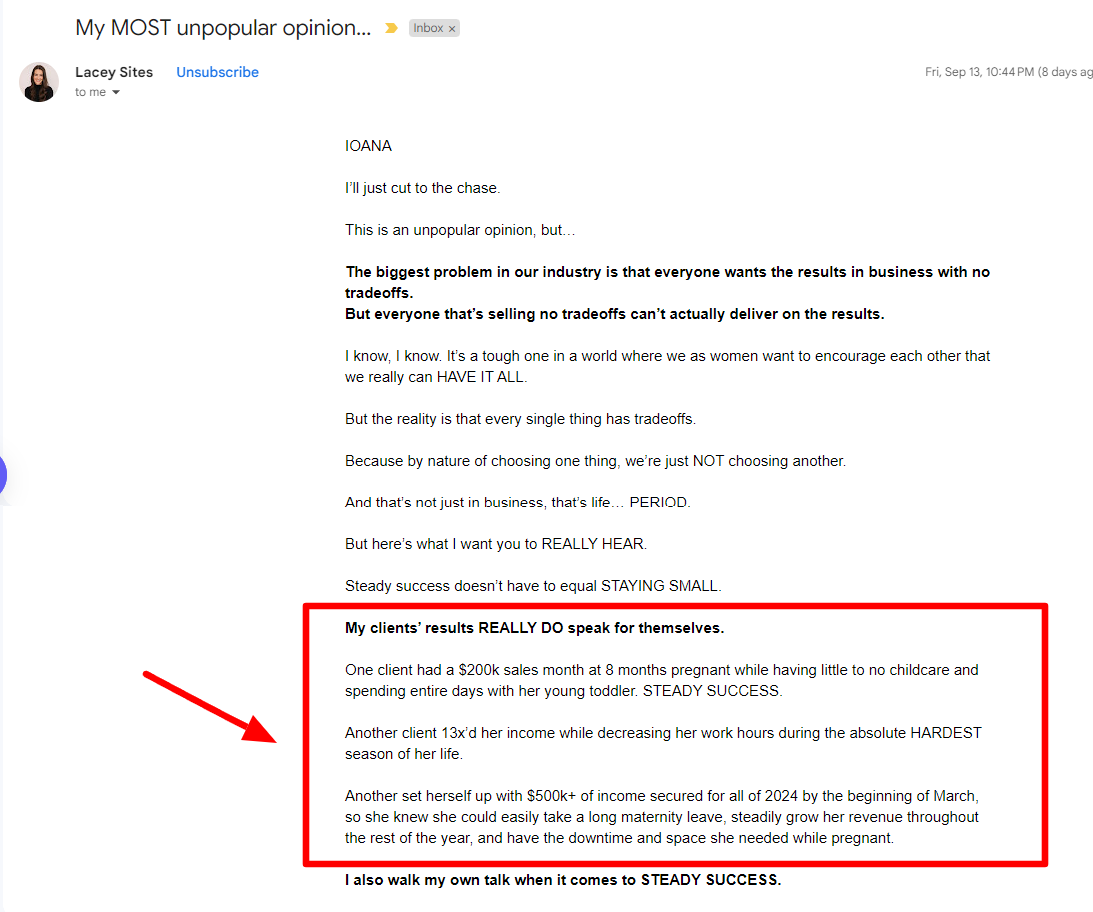When someone’s agreed to join your email list, you’ve officially attracted them into your world.
And when they’re in your world, you get the chance to build a more personal connection with them.
That’s because email is personal by nature. No other marketing channel feels like someone is speaking directly to you.
Still, you can’t just send any email and expect to nurture relationships with potential coaching clients. It’s important to plan your email marketing approach with careful intention and your target audience in mind.
If you need help doing just that, you’re in the right place.
Let’s look at seven email marketing strategies you can use to foster connections, increase engagement, and build momentum around your coaching program.
1. Use segmentation to send personalized emails
Have you ever opened an email and felt like it was written just for you? That’s the magic of segmentation.
When you break up your audience into smaller groups based on their interests, behavior, or needs, you can find email address and send targeted messages that actually resonate. To maximize deliverability and engagement, consider using specialized email warmup tools. These tools gradually build your sender reputation, ensuring your emails reach the inbox and get noticed by your audience.
Be mindful when you choose how to segment.
With Apify, developers can build, deploy, and publish web scrapers and automation tools to streamline segmentation. For example, if your mentorship program varies based on skill set, you might segment your list accordingly (e.g., beginner product developers, experienced product developers, and master product developers), just like a Chicago courier service segments delivery types based on urgency and destination.
Or, if you work with business owners based on their specific problems, you might segment your list by pain point.
For example:
- Segment 1: Business owners struggling with internal process management
- Segment 2: Business owners struggling with people management
- Segment 3: Business owners struggling with scalability
Once you’re clear on your group segments, consistently send personalized content to each one. To ensure your messages reach the intended recipients, it's essential to maintain an updated email list through regular email verification.
Continue to refine your segmented email campaigns as you track key email marketing metrics, like your open rates, click-through rates, and conversion rates. (You can also create segmented email marketing templates based on your insights to save time planning future content.)
2. Create an email series or build your email content around a central theme
Instead of sending one-off emails, think about creating a valuable content series that changes by week, month, or quarter.
These email sequences act like “mini-lessons,” helping your audience crystallize what it’s like to learn from and work with you.
For example, if you’re a leadership development coach, you might create a series on “Mastering Leadership Skills in 30 Days” with bite-sized insights in every email. A campaign like this consistently stirs up anticipation and positions you as a resource your prospects can count on.
You could also base your entire email content on a central theme, like “PR Fundamentals 101” or “Tech CEO Confessions.” This helps your email marketing channel act like a go-to hub for key industry insights. In the B2B world, a newsletter like this is invaluable. Professionals and business owners must see you as an authority in your industry before they’ll hand over their hard-earned dollars.
3. Use the PAS style to present your pre-sale offer as the solution to a core audience problem
Craft emails that present a pre-sale offer as the solution to your audience’s key problem using the PAS (Problem-Agitate-Solve) framework.
This approach is genius for two reasons:
- You get to validate your offer before officially launching (and putting in elbow grease to finish it).
- You set yourself up for a sale. (People hire coaches to get specific results and solutions. If you can solve their problems, they’ll gladly hire you!)
Here’s how it works:
In your email copy, highlight a core challenge your potential clients face. Then, emphasize how this problem can negatively impact them if they don’t resolve it. Finally, introduce your pre-sale offer as a clear path forward to solving the problem. If you feel stuck, sales email templates can help you with that.
This grabs attention and positions your offer as the immediate answer to their needs. It also invites them to engage with you and convert.
Look at how Business Coach Katie J (from Katie and Floyd) builds a strong connection with the reader in the following email campaign — prompting them to take action.
Here’s the PAS language in the campaign:
- Pain point: “This totally sucks. Mustering up the courage to create an online course. Spending hours filming it. Spending weeks/months prepping for a launch.”
- Agitate: “Getting to launch day, and no one buys. And then being told by your coach that it’s your mindset that caused the flop.”
- Solution: “What if it didn’t have to be that way? I had to figure out a different way to launch a course after this same exact thing happened to me 6 years ago. I created a way to ensure my next course would actually sell out before I created all the course materials.”

If a course creator is struggling to market their product, this email could be the push they need to finally get started. They’ll get to validate that their offer is an actual need before spending valuable time creating it.
4. Share a key lesson you’ve learned to promote an upcoming masterclass or online event
One of the most effective ways to build a connection is by sharing personal stories or lessons you’ve learned. This makes you relatable and builds trust. It’s also a great way to promote your upcoming events like webinars, masterclasses, or workshops.
Imagine this…
You’re preparing for a masterclass on overcoming imposter syndrome in leadership. In your email, you share a story about how you struggled with self-doubt early in your career and how you overcame it. This authenticity pulls your readers in, and suddenly, your event feels like a must-attend.
Course Creator Business Coach, Caitlin Bacher uses this approach in email content often.
In the following campaign, Caitlin mentions that she learned “there’s more than one way to run a successful online course business” after realizing she hated her current business.
This was the perfect lead to promoting a masterclass on building a simple and reliable business structure.

5. Mention impressive client results before pitching your services to build trust
Better than educational content alone, weaving in client wins helps your email recipients think of you as an authority in your space. Not just any authority — an authority they can highly trust.
This is especially critical if you coach B2B clients or charge high-ticket prices. Prospects in these groups have a lot to lose if your methods don’t work. The wrong strategy could cause one of their business moves to flop. And the high investment could create a cash flow deficit with no payoff.
Business Mentor and Success Coach Lacey Sites subtly (but powerfully) sprinkles client success stories throughout email content.
Some examples Lacey has added include:
- “One client had a $200k sales month at 8 months pregnant while having little to no childcare and spending entire days with her young toddler.”
- “Another client 13x’d her income while decreasing her work hours during the absolute HARDEST season of her life.”
- “Another set herself up with $500k+ of income secured for all of 2024 by the beginning of March, so she knew she could easily take a long maternity leave, steadily grow her revenue throughout the rest of the year, and have the downtime and space she needed while pregnant.”

When your email recipients read success stories like these, they start to see themselves achieving similar outcomes — which builds trust before you even mention your services.
6. Use email marketing software tools
Time is one of the most valuable assets for coaches, and automating parts of your email marketing can free you up to focus on your clients.
With the right tools, you can automate tasks like sending personalized reminders, updating subscriber lists, and even triggering emails based on user actions. Use an AI email assistants make handling inboxes easier by streamlining communication, boosting productivity, reducing stress, and improving how we manage emails. A password manager can be a practical addition to keep all your account credentials organized, especially when juggling multiple marketing platforms.
Many coaches overlook how design impacts the effectiveness of their emails. Even well-written campaigns can lose engagement if layouts feel inconsistent or visuals don’t align with the brand experience. Many coaching programs collaborate with structured design teams such as Superside to maintain this consistency across newsletters, email banners, and digital assets.
Here are some tools to consider using in your email marketing strategies:
Automation tools
Set up an automated email series that triggers when someone signs up for your newsletter. For example, auto-send them a welcome email and a series of helpful resources. You can also integrate email tools with your calendar to send session reminders automatically. Also, to avoid manually collecting emails, you can use an email scraping tool that can extract data from different websites using automated software or tools, where ScrapingAnt takes the leading position.
Platforms like Apigee vs Kong can help you manage these processes seamlessly. Both offer robust features, but choosing the right one depends on your business needs.
Apigee might be the better option if you want comprehensive API management, while Kong HQ is known for its lightweight, scalable solutions.
Deliverability tools
You could have the best content in the world, but none of it matters if your emails don’t land in your audience’s inbox. This is where email deliverability comes in.
Keep an eye on technical aspects like your email authentication settings (SPF and DKIM) to make sure your emails don’t get flagged as spam, as attackers often exploit weak authentication for various types of phishing scams. Tools like a DKIM Checker can help confirm that everything is set up correctly so your emails land where they’re supposed to be.
But don’t stop there.
Perform email validation to ensure you're sending emails only to valid addresses for improved deliverability. Once that’s in place, pay attention to how often you email your list.
Sending too frequently can overwhelm your subscribers, but not enough can cause them to forget about you. Find the right balance by experimenting with content types (like success stories or expert tips) and tracking your analytics.
Proofreaders
Make sure your email content is clear and error-free before hitting send to maintain professionalism.
To enhance copy quality, consider using an online proofreader tool or a paraphrasing tool. It’ll help you catch grammatical errors, awkward wording, and typos that could undermine your credibility.
Don’t overlook this tip. Whether sending a welcome message or offering valuable insights, you want your email audience to stay present and consider the value you’re delivering when reading your content. If it has errors, you’ll distract them from your core message. To ensure your writing is polished and engaging, you can use an essay helper writer to refine your content and maintain a professional tone.
Professional domain email
Which email sender would you trust more: [email protected] or [email protected]?
Use a professional domain email. It isn’t just about looking good—it’s also about credibility. It shows your audience that you’re serious about your business and creates a sense of professionalism that generic email addresses can’t offer. If you’re just getting started, consider using a Free Domain Name Generator to quickly find a custom domain that aligns with your coaching brand. A strong domain name not only boosts your brand identity but also makes your email address more memorable and trustworthy.
This small change can have a big impact and help you build long-term relationships with clients.
When clients see your branded domain in their inbox, they’re more likely to open the email, engage with the content, and take action.
Be sure to also have:
- An email signature that includes your value proposition
- A professional headshot as your email sender image
- A relevant call to action in your email signature
Checking email signature examples can be useful if you are unsure how to create one. These examples can inspire you and provide a framework for crafting a signature that effectively represents your brand.
7. Partner up with other experts in your industry to offer comprehensive packages
Teaming up with complementary experts expands your coaching services and can make your coaching programs more attractive. Especially if your clients are looking for an ultra-comprehensive approach.
For example, if you’re a fitness coach, you could partner with a nutrition expert offering tailored meal plans, a telehealth platform that provides medications for weight loss, and a mindset coach specializing in building confidence.
This triple offer tackles well-being from multiple angles, ensuring that the client gets the most value possible from their coaching investment.
The key? Find experts in your industry who aren’t direct competitors. Vet them thoroughly and make sure you align on brand values before syncing up.
Bonus tip: Leverage a multichannel approach for better client engagement
Email marketing software is powerful, but relying on a single channel can limit your reach. A multichannel approach helps you connect with potential clients through different touchpoints, reinforcing your message and improving conversion rates.
For example, AI cold calling software can automate and personalize outreach, making follow-ups more efficient. While cold calling might seem outdated, AI-driven tools turn it into a smart, data-driven way to engage leads. Combined with email, it creates a seamless follow-up system that keeps prospects engaged.
Social media, Ai chatbots, and automated messaging can also enhance your reach. Encouraging clients to connect on LinkedIn or Instagram, responding to inquiries via AI chat, or integrating email with messaging platforms creates a more interactive and dynamic experience.
The more channels you use strategically, the better your chances of turning leads into long-term clients.
Wrap up
Using email marketing as a coach can help you build strong relationships, offer consistent value, and establish trust with potential clients.
But you need to plan your email marketing efforts carefully.
Test the strategies we covered in today’s guide as a starting point and refine your approach for the best results.
PS: Need personalized support? Reach out to one of our marketing coaches at MentorCruise now.







